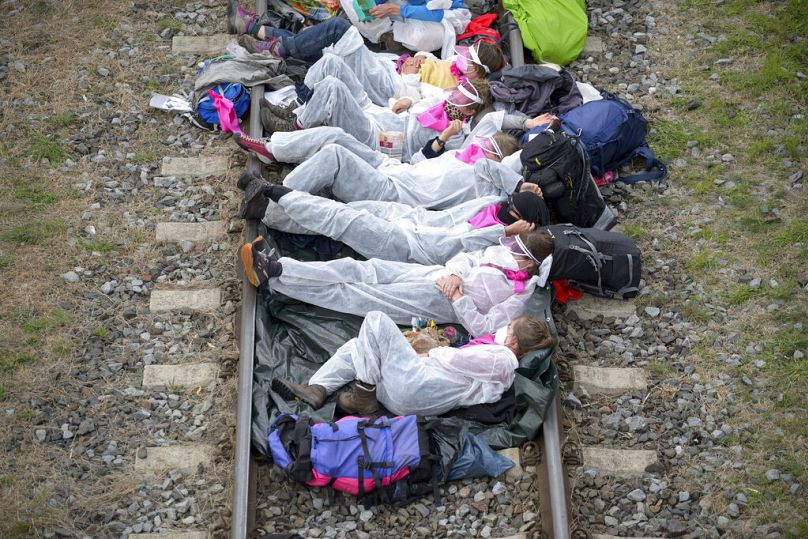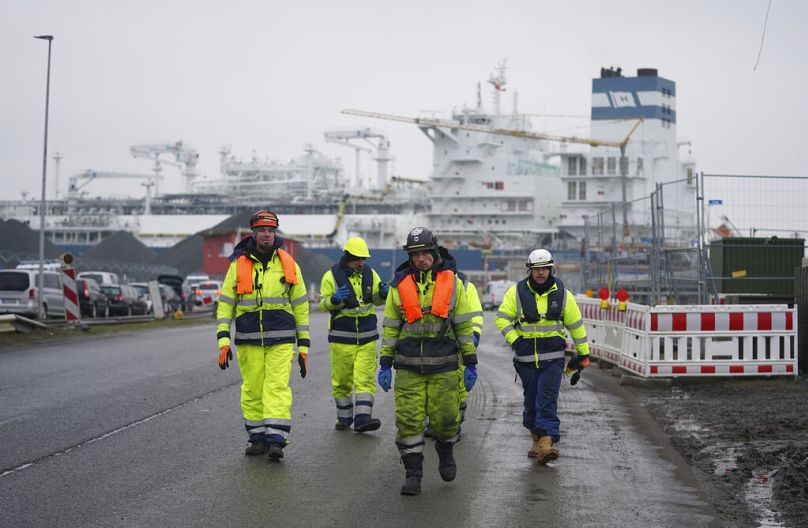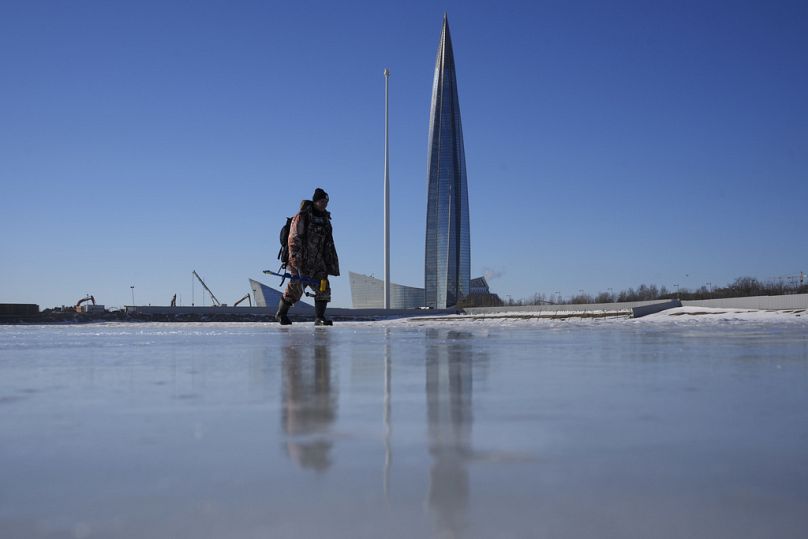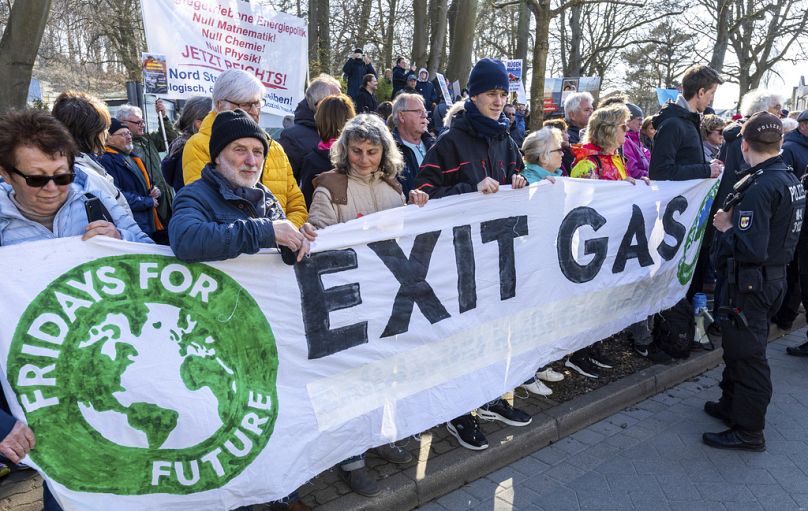We cannot let the continued energy crisis be used to further strip away any hope we have for stopping the worst impacts of climate change, Anusha Narayanan and Tal Harris write.
Russia’s invasion of Ukraine last year resulted in a massive increase in US gas exports to Europe.
US gas exports to Europe were up by 140% in 2022 compared with 2021, and a record 17 long-term contracts were signed between European companies and US LNG terminals.
Dozens of new LNG terminals were built, are under construction, or are proposed on both sides of the Atlantic.
The health, social and environmental consequences of this massive buildout are beyond dire. And they’re entirely avoidable.
The new EU LNG terminals would have a total carbon footprint of 950 million tonnes of CO2-eq per year. That’s equivalent to the annual emissions of over 200 million cars.
And some contracts being signed by European and US companies lock us into two decades or more of such pollution, far beyond the necessary deadline for phasing-out fossil gas.
These contracts also require more export and import terminals. Once built, they could be used by polluters to advocate for further delaying the phase-out date in order to prevent them from turning into stranded assets.
This buildout flies in the face of science: our planet cannot (and need not) afford any fossil fuel expansion if we’re going to avoid the worst climate impacts.
Unnecessary decisions only further perpetuate the crises
It is also shockingly unnecessary: new terminals can take up to five years to build and thus do nothing to meet current energy needs.
A new report by Greenpeace International finds that the existing capacity in Europe’s LNG terminals is already larger than needed.
Even in 2022 — the most intense LNG year to date, when Russian fossil fuels supply to Europe was sharply reduced — terminal utilisation rates across Europe remained low, and they had more capacity than they would normally require.
It’s no accident that we have bad policies. Policies have been shaped by ENTSOG, the gas industry’s leading group in the EU.
European governments have appointed ENTSOG to find “the solution” to the energy crisis — a crisis created by dependence on the fossil fuel industry in the first place.
It’s no wonder a gas lobby is recommending more of the same, thereby perpetuating both the energy and climate crises.
Instead of seeking energy independence, Europe chose more of the same
Europeans now must pay for new infrastructure for an industry they only recently bailed out.
And they’ll pay even more in the future when promises of repurposing those terminals to green hydrogen turn out to be technically complicated, financially costly, and based on unproven calculations.
Instead of trying to sustain a gas-reliant energy system, this crisis could be a moment to invest in real solutions to both keep our planet habitable and meet our energy needs.
Gas is widely used in Europe for power generation, industry, and over 30% of household heating.
That makes it highly dependent on imports, and instead of using the crisis with Russia to break away from gas altogether, the EU only switched to the US as an alternative supplier of an even dirtier gas: LNG.
On the US side, most LNG production and export facilities are located near low-income communities, already suffering from well-documented health impacts of the oil and gas industry, including in the horrifyingly nicknamed “cancer alley.”
Now the climate crisis ravages across the whole of America.
And LNG is making it far worse: while Russian piped gas was already a climate killer, LNG’s emissions — from liquefaction, transport, and regassing, to power generation, as well as methane leaks — make its climate impact far worse.
Russia's war should not be used as an excuse
Gas producers and operators used Russia’s war against Ukraine to spin US and European policy priorities away from climate goals, telling a tale about energy security.
Yet a divorce from Russia’s fossil fuels must not end in a new miserable marriage of US-EU gas barons. European consumers need not sponsor their own shock treatment.
The top five oil and gas companies made record profits in 2022 while citizens were facing skyrocketing energy bills.
If invested in renewables, the dividends and share buybacks paid to the shareholders in 2022 could be the downpayment for generating 79% of US electricity or 111% of EU electricity in 2021.
No miracles are needed. Yet instead of investing their historic profits into aligning their business model with the Paris Agreement on climate, they returned large amounts to shareholders.
Our focus should be on transformative climate action
We cannot let the continued energy crisis be used to further strip away any hope we have for stopping the worst impacts of climate change.
We must instead shift political power from the fossil fuel industry, hold them accountable and implement immediate measures to support climate targets and benefit citizens.
A massive insulation plan for buildings would mean lower energy demand. An accelerated shift to renewable energy would mean cheaper supply.
Citizens have voted for transformative climate action. Protecting our homes from a climate catastrophe means a global north LNG phase-out by 2030, pipelined gas phase-out by 2035 and carbon neutrality by 2040.
Blocking fossil fuel companies from politics, enacting due diligence laws, imposing transparency and ending access to decision-making and climate talks for lobbies like ENTSOG would be a shock treatment for the oil and gas industry itself.
Making polluters pay and holding them accountable — following a colonial and neocolonial legacy that leaves billions exposed to unprecedented climate risks — would finally do justice.
Anusha Narayanan leads the global campaign to stop fossil fuel expansion at Greenpeace US, and Tal Harris is the campaign's global communications lead.
At Euronews, we believe all views matter. Contact us at view@euronews.com to send pitches or submissions and be part of the conversation.















